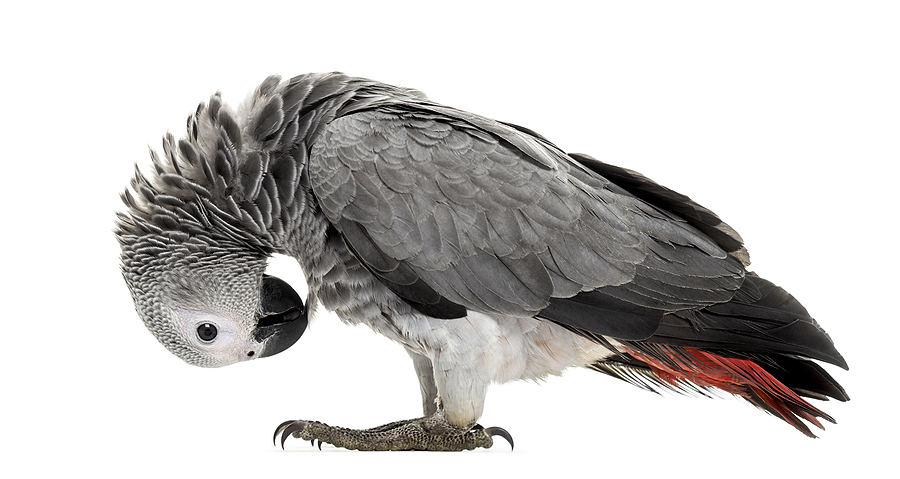We’ve all seen both wild and pet birds meticulously preen their feathers, keeping them clean, smooth, and lubricated. Preening is normal—and the sign of a healthy bird. But what’s going on when pet birds take preening one (or more) steps beyond the norm? When preening becomes obsessive feather picking/plucking, or, worse, self-mutilation, it’s time for an avian veterinarian to become involved.
What Does Feather Picking/Plucking Look Like?
A bird who is preening to the point of destroying feathers, often down to the shaft, has crossed the threshold from self-grooming into feather picking (also called feather plucking). The extent of this picking can range from feather shredding to pulling the feathers out completely, leaving the bird’s bare skin exposed. Even beyond feather picking, a pet bird may also start self-mutilating—that is, chewing bare skin. Such activity can cause infection and, without treatment, can be fatal.
What Are the Causes?
Once your bird has started feather picking, it’s crucial to rule out underlying illnesses (e.g., diseases, viral and bacterial infections, chronic pain, allergies, vitamin deficiencies, toxins, etc.). Don’t wait to take your bird to an avian veterinarian for an exam. If the picking is the result of a physical illness, the veterinarian can work with you on a plan of action to restore your pet bird’s health before the picking progresses further.
Psittacine Beak and Feather Disease (PBFD), a potentially fatal disease caused by psittacine circovirus, manifests in a way in which the affected bird loses feathers, meaning they fall out. Different from what we are addressing as feather picking, PBFD is most common in cockatoos, African grey parrots, lovebirds, Eclectus parrots, and ring-necked parakeets. However, it’s important to rule this out as the cause of feather loss, which, again, can be ascertained by your avian veterinarian.
If not a specific underlying illness, the cause may be linked to a poor diet. Avian nutrition has grown by leaps and bounds in the past 20 years, and we now know that a varied and balanced diet that contains nutrients necessary for avian health is vital to helping your pet bird thrive.
Other causes may be more psychological in nature, often resulting from lack of mental and physical stimulation, boredom, or stress. Stress can be caused by problems with your bird’s environment. These can include cage placement (in an area that is either too busy or too isolated), lack of natural light, other pets that frighten your bird by jumping on the cage, or an overly cramped cage.
What Can You Do to Help?
If your bird’s feather picking has been deemed behavioral in nature, you can try any of a number of things to improve psychological wellbeing. Provide challenging toys—some are designed specifically for feather pickers, made with shreddable materials such as jute, cloth, or other fibrous items. Place your bird’s cage in an area of the household where he can see and hear human activity, but not in a high-traffic area where he can become overly agitated or stressed. Place the cage in an area that receives natural light and that is away from rooms that may contain toxic fumes, such as the kitchen.
If the cause is dietary, seek your veterinarian’s advice on what constitutes a healthy diet for your pet bird species. Some need more fat in their diet, while others require more fresh foods. Above all, offer a variety of food items to ensure your bird receives all the vitamins and minerals he needs to maintain good health.
Feather picking caused by underlying illnesses or other physical issues will need to be diagnosed and treated by your avian veterinarian. In these instances, the sooner you get your bird to the vet and started on a course of treatment, the better chance he has of recovering his health.
Feather picking can result from a combination of factors: environment, stress, diet, and physiology. If you observe your pet parrot engaging in what appears to be excessive preening and you are providing mental stimulation with toys, a healthful and varied diet, and a safe and stress-free environment, consult your avian veterinarian as soon as possible to determine if there is a physical cause, and follow your vet’s guidance to help your plucky pet regain his fabulous feathers.
This article was reviewed/edited by board-certified veterinary behaviorist Dr. Kenneth Martin and/or veterinary technician specialist in behavior Debbie Martin, LVT.








